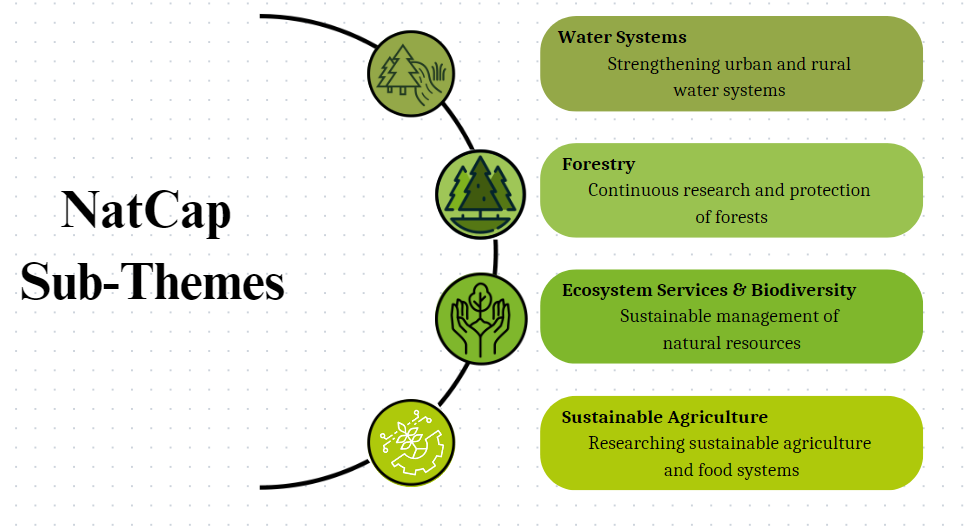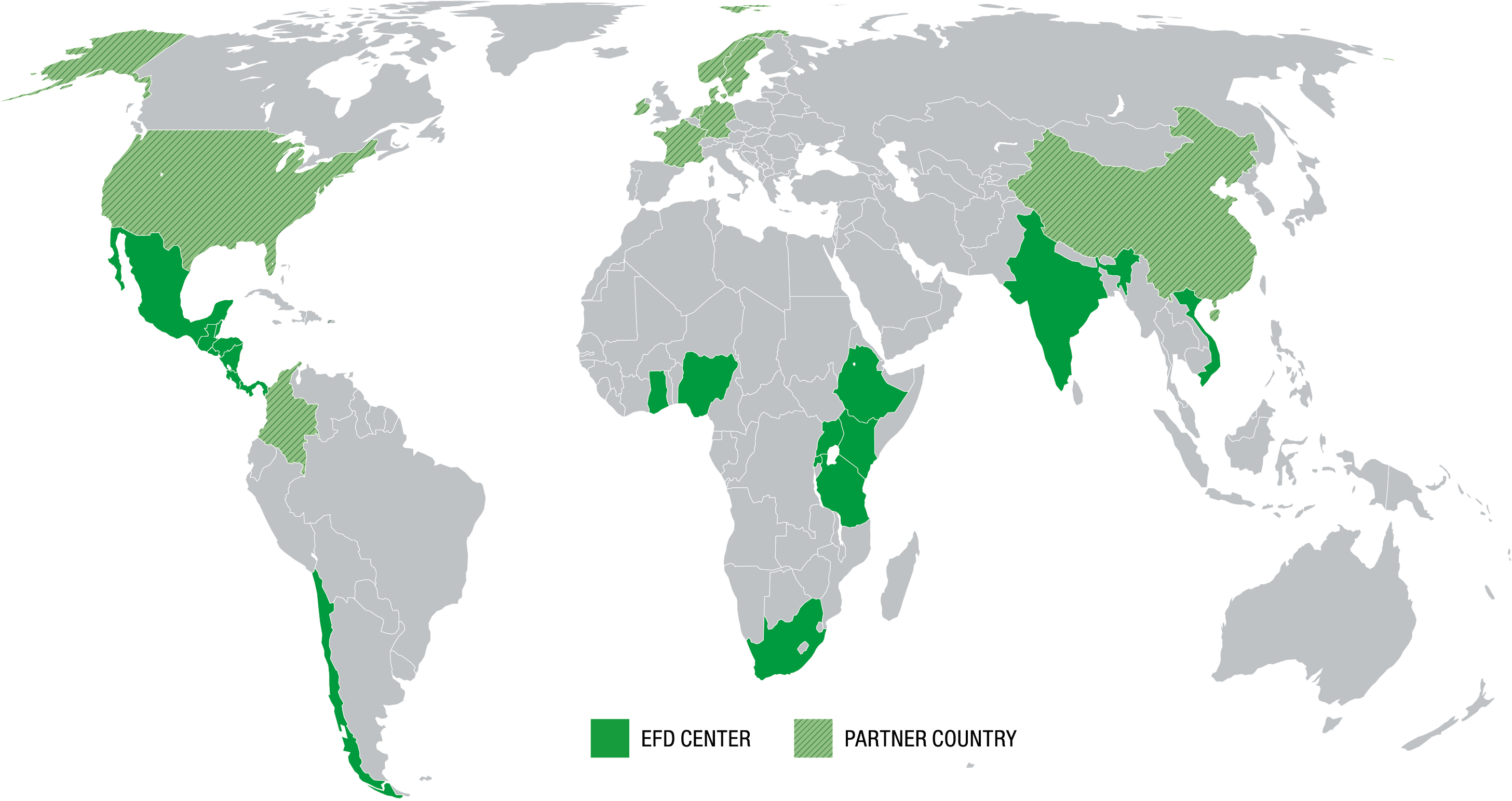
The Natural Capital (NatCap) collaborative was founded in 2021, and expanded from its initial focus on ecosystem services valuation under the collaborative Ecosystem Services Accounting for Development (ESAforD) project which ran from 2015 to 2020.
During 2021 the NatCap collaborative found its natural base at EfD South Africa, the Environmental Policy Research Unit (EPRU), hosted by the University of Cape Town. EPRU has been instrumental in providing valuable and impactful environmental economic research that influences policy not just in South Africa but throughout the Global South.
Going forward, NatCap will continue to attract new and established researchers who are as dedicated and passionate about the field of environmental economics and are focused on effecting change. This will have been done through dedicated research on water systems, ecosystem services & biodiversity, and sustainable agriculture, in collaboration with researchers throughout the global EfD network. Though NatCaps research targets are challenges in the environmental sector, NatCap’s overarching social ambitions are the reduction of poverty and gender equality.

NatCap as part of the global EfD Initiative
NatCap is part of the global Environment for Development (EfD) Initiative, a network of similar centers in the Global South, with a secretariat based in Sweden at the University of Gothenburg’s Environmental Economics Unit. EfD consists of over 12 environmental economics research centers across the world, including Central America, Chile, China, Colombia, Ethiopia, Kenya, India, Sweden, Tanzania, Vietnam, and USA.
The EfD initiative enables the NatCap collaborative to draw on a rich network of highly skilled academics trained in environmental economics, thus promoting international collaboration. Membership of EfD facilitates publication of research by providing direct access to the international working paper series located at Resources for the Future.
NatCap is predominantly funded by the Swedish International Development Cooperation Agency (Sida) through the Environment for Development (EfD) Initiative managed by the Environmental Economics Unit (EEU) at the University of Gothenburg.

NatCap’s Vision
It is our objective to improve the knowledge and empirical experience of valuing ecosystem services and biodiversity, water systems, and sustainable agriculture in order to better account for these services throughout the Global South.
NatCap’s Overarching Goals
NatCap's overarching goal is to stimulate policy action across the Global South to implement research based sustainable practices for ecosystem services and biodiversity, water systems, and sustainable agriculture. As well as, promote collaborative interlinked research within EfD centers and with researchers outside of the EfD network as well as between entry-level and experienced researchers.
The NatCap collaborative aims to achieve these goals under three distinct initiatives or themes:
Ecosystem Services and Biodiversity
1) To promote the management of natural resources through nature based solutions based on the principles of natural accounting practices.
2) Stimulate the increased development of ecological infrastructure.
3) Popularize the use of payment for ecosystem services throughout the Global South.
Water Systems
1) Investigate and advocate for equitable burden sharing arrangements concerning water scarcity through behavioural economics principles and tariff structures.
2) Develop novel strategies that strengthen urban and rural water systems' resilience to climate change and human activity.
3) Stimulate sustainable approaches for the development and protection of natural and artificial water infrastructure.
Sustainable Agriculture
1) Conduct and disseminate rigorous research on the inter-linkages between sustainable agriculture and food systems.
2) Boost novel agricultural risk mitigation policies for climate variability to improve access to safe and nutritious food and reduce poverty.
3) The successful implementation of innovative soil conservation methods that develop agricultural adaptation for enhanced resilience to climate change.
Forestry
1) To generate new knowledge on forests in South Africa and the Global South.
2) Better guide the conversation on conservation, restoration and management of forests.
3) Utilise a wide range of techniques available through EfD collaborations to further the forestry field.
Research
NatCap provides open, equal, opportunities for researchers to take an active part in the goal of investigating the gaps and opportunities for environmental policy improvement within the Global South. This is done by the use of the Collaborative to encourage a global group of researchers to connect on shared passions to address vital issues. Further enabling the effective dissemination of research results.
The focus of NatCap must be to fill the gaps within the environmental economic literature with policy impacting research for the Global South. Virtually every country within the Global South suffers from at least one, if not all, of research areas that NatCap aims to explore and reduce. The need for inclusive holistic research that takes into account the nature of communities, countries, and regions is critical in affecting substantial, meaningful change. To do this, NatCap will use and expand its network connections with EfD centers, universities, policymakers, and other research centers, across the Global South alongside collaboration with these same players in the Global North.
Policy Engagement
NatCaps policy engagement objectives are to: i) promote engagement between researchers and policymakers on an ongoing basis; ii) generate interconnectedness between policymakers from different countries; iii) foster connections between public and private sectors.
NatCap was founded with the primary objective of engaging with policymakers about green accounting and ecosystem services. This is still the case, however, NatCap is also expanding its scope to include the research and policy engagement of topics to do with water systems and sustainable agriculture.
NatCap recognises that policymakers from different countries need to interact with one another in a climate-focused space to facilitate the implementation of effective policies across borders and regions. In addition, the fostering of relationships between policymakers and stakeholders from different regions is also vital for the generation of new potential policies that are formed around the gaps and opportunities made clear by a local perspective.
Steering Committee
Our aim is to allow a diverse representation of the NatCap stakeholders:
Director - Prof Martine Visser, South Africa
Global Hub Representative (currently available position) (Associate Prof Gunnar Köhlin)
Initiative Leader - Dr Jane Turpie, South Africa, Dr Róger Madrigal, Central America, Dr Mintewab Bezabih, Ethiopia
Thought Leader - Dr Glenn-Marie Lange
Initiative Committees
Ecosystem services and biodiversity
Theme Leader - Dr Jane Turpie, South Africa
Representatives - Dr Glenn-Marie Lange, Jorge Maldonado, Dr Dawit Mulatu
Water systems
Theme Leader - Dr Róger Madrigal, Central America
Representatives - Prof Joe Cook, Dr David Fuente, Feliipe Vasquez, Prof Martine Visser
Sustainable agriculture
Theme Leader - Dr Mintewab Bezabih, Ethiopia
Representatives - Prof Salvatore Di Falco, Dr Menale Kassie, Dr Chalmers Mulwa, Dr Nnaemeka Chukwuone, Prof Martine Visser
Forestry
Due to the recent addition of Forestry as an initiative under the NatCap umbrella, the Forestry committee is still being finalized. The committee members will be included once they have been finalized.
Administrative staff
Administrator - Felicity Downes
Funded by
